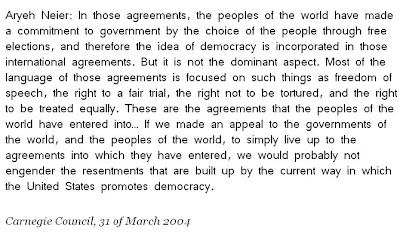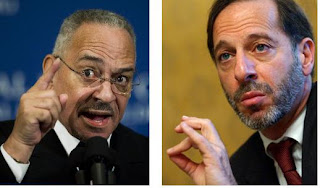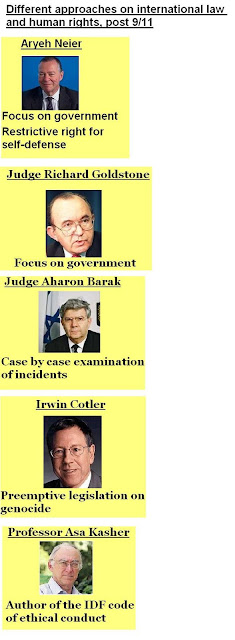Judge Richard Goldstone told Israeli television that the UN is indeed biased against Israel. This gesture towards Israel is contrasted by the anti-Israel bias of the other members of his commission. This became obvious first with professor Christine Chinkin who signed a public letter that was published in the
'Times of London,' which condemned Israel for war crimes, while the war was ongoing. It described Israel’s defense of its citizens as uncalled for, even though Israel refrained from action during eight months of constant bombardment of its population centers in the south by Hamas. The last to surface was Colonel Desmond Travers, the mission’s only military expert. A retired officer of the Irish army, he served in numerous peacekeeping duties including UNIFIL. As
was revealed by Dore Gold and retired Lt. Colonel Jonathan Dahoah Halevi, this former peacekeeper accused Israel in advance of deliberately killing civilians in Gaza, and as many as possible according to him. He refused to accept any Israeli evidence submitted to the commission. He claimed that such evidence is unreliable even though he could not prove it. He also accused Israel of
deliberately killing Irish soldiers serving in UNIFIL:
"taken out and deliberately shot". This accusation is so far unique to him, since an Internet search found no other mention of this charge. Whatever the reasons for his prejudgment, he is clearly not objective and is hostile towards Israel.
The remaining member of the commission, Hina Jilani, is a lawyer with the Pakistani Supreme Court and veteran human rights and women’s rights campaigner in her country. While it is possible that she is capable of objectivity towards Israel, such objectivity will be by Pakistani standards. In Pakistan, Israel is as reviled as much as India, and religious tension begets mass terrorism and violence. It is unlikely that one would find people there who would speak on behalf India or Israel. By contrast, in Israel there are many advocates of the Palestinian cause, but nobody would expect an Israeli to be an objective judge in a case involving an Arab or Muslim country.
It is apparent that people who have anti-Israel bias surround Judge Goldstone. It is most evident when we look at the other members of his commission, but that is not where this ends. Have a look at the ‘
Institute for Criminal Investigations’ or ICI, where he serves along with Colonel Desmond Travers and Hina Jilani. This is a consultative body to the ‘
International Criminal Court’ in the Hague, and one of its distinguished members is professor Cherif Bassiouni of DePaul University, a colleague of Goldstone from the Yugoslavia years. (In Yugoslavia, he served as chairman of the Security Council's commission to investigate war crimes from 1992-1994 with Goldstone, who was the chief prosecutor.) Like Judge Goldstone, Professor Bassiouni is a heavyweight in the human rights community, and was nominated for the Nobel Prize for peace in 1999. He is also a cosignatory of the public letter condemning Israel of war crimes in advance, along with Christine Chinkin and Richard Falk. Falk, the UNHRC Special Rapporteur on Conditions in the Occupied Palestinian Territories, is the best and most extreme example of the UN anti-Israel bias, see YouTube link below.

Another association to look at is that of like-minded people. Distinguished persons like Arye Neier, whose views regarding the role of international law and human rights in this post 9/11 world have some common themes with those of judge Goldstone. This became evident at the
‘Empire and Liberty Project’ event at the
‘Carnegie Council on Ethics in International Affairs,’ in March 2004, which they both attended.
Aryeh Neier is a former senior member in the ACLU and cofounder of ‘Human Rights Watch’, where he was the vice chairman for 12 years. Currently he is the head of the ‘Open Society’ and president of the ‘
Soros Foundation,’ which forms another complete circle, because organizations funded by George Soros are advancing ‘The Goldstone Report’ in
Washington DC. (Heather Ryan of the ‘Open Society’ also serves in the ICI along with Goldstone and the others mentioned above.)
Aryeh Neier has no evident anti-Israel obsession, but whenever ‘Human Rights Watch’ was criticized for mistreating Israel he was there to defend, whether over Lebanon or Gaza. Even when it came from the cofounder of ‘Human Rights Watch’,
Robert L. Bernstein. Bernstein`s criticism, pointed to Israel being an open society where human rights and human rights awareness can be advanced through open dialogue and education. He pointed to the need to deny moral equivalency to tyrannies that will only use it to justify and excuse their suppression of human rights in their countries.
Neier's response was to point out who is the lawyer among the two, (he is), and who is just a book vendor/publisher. He also made the bewildering suggestion that the United States was an open society during the days of slavery and racial segregation. This skewed view of history, skewed to the right by the way, has no bearing on the issue at hand because it belongs to the category of countries mistreating their own people and has nothing to do with the current dilemmas facing Israel and other democracies, that need to balance their security with concern to the civilian population in enemy-held territory.
Arye Neier belittled the concern over the exaggerated emphasis on Israel, as
"dismissing democracy with a slap on the hand," a view echoed by Judge Goldstone in the interview he gave to Christiane Amanpour in her current-affairs program on CNN in September 30
th 2009, and a false representation of Bernstein criticism. Not surprisingly, Neier is one of the defenders of the Goldstone report.
The ‘Empire and Liberty project’ at the Carnegie Council was aimed at confronting the new threats to human rights in this new era. No small challenge indeed and one that must never be trifled with. Before 9/11 human rights organizations focused on how governments treat the individual. After 9/11 a third factor entered the equation, the terrorist organizations, whose faith and practices are aimed at abolishing human rights completely, but whose members deserve protection of their human rights against the governments fighting them. Measures such as Guantanamo Bay, and ‘The Patriot Act’ represent serious human rights dilemmas, whether we agree with them or not. These are dilemmas, which the state of Israel and its judiciary are all too familiar with. And undeniably many governments around the world do use the war on terror as an excuse to put the squeeze on their citizens' liberties. This requires the human rights community and its experts to be prosecutors, defenders, judges, legislators, and counsel to all of them. However, at the Carnegie Council in March 2004, none of its distinguished participants rose to the occasion. Judge Richard Goldstone and Arye Neier had two dominating themes in their message: “
promotion of democracy only through international law” and “
democracy compliance,” an uncomfortable combination of words from a democratically concerned point of view.
But what is most noticeable is what wasn’t in their remarks. The first was a lack of alternative to the much criticized Guantanamo Bay and ‘The Patriot Act’. This is not some vague omission unique to these two men at that one long-ago event. This is a characteristic of the entire camp of critics of the Bush administration human rights policies during the war on terror. As a result of this deficiency the Obama administration cannot close Guantanamo Bay, and had even extended
‘The Patriot Act’; all because during Bush’s two terms in office none of his critics had ever searched for alternatives. This now leaves the Obama administration improvising from scratch.
What is of great concern to Israel, government and citizenry, is the lack of reference to the corruption of international law. And what can be more corrupt than a human rights council dominated by the worst human rights abusers? This is something that had existed in 2004 as well. Neier resolved this concern by the suggesting that the governments that had entered into the agreements that produced international law would take care of that, governments, which earlier in that conference were criticized on those very issues.

Neier also described suicide bombings as an act of desperation, saying that therefore nothing can be done about them. This ‘no we cannot’ approach is false; suicide bombing is the product of brainwashing and pressure. Worse than that, his faulty reasoning comes from Palestinian propaganda intended to justify the horrific wave of suicide bombings Israelis were subjected to from 2001 to 2004. Here it rationalizes his do-nothing approach. But what is really shocking is Neier’s view on the preemptive use of force as a part of the right to self-defense. While he acknowledges that the current international law allows it, he would prefer a more restrictive approach, allowing military intervention only when an attack is imminent or when there is genocide. If preemptive military intervention fails there may not be enough time for plan B when the threat is imminent, which may lead the side trying to prevent an attack to take more desperate measures that can inflict greater harm on civilians. And if genocide had just begun, then by the time a military intervention begins to take effect, there will be at least several hundred individuals for whom this will be too late, much, much too late.

This Goldstone-Neier approach of focus on governments carries another troubling risk, the risk of losing sight of who else is confronting one of those governments alongside the human rights organizations. It can be someone like Moazzem Begg, a former Taliban fighter; released from Guantanamo Bay, who is currently advancing fundamentalist ideologies in Great Britain. And Amnesty International UK branch had no problems
collaborating with him. (This makes me wonder whether Ravi Nair of the above-mentioned ICI who used to work with Amnesty International in London, shares this focus on government approach. This by no means suggests he has anything to do with that particular episode.)
Debating Dore Gold at Brandeis University on November 5, 2009, Goldstone tried to defend the membership of Christine Chinkin in the commission, despite the fact that she had prejudged the issue by signing a declaration against alleged Israeli "war crimes. He claimed that the situation was obvious based on the reports of Al-Jazeera, which he took to be an unbiased news source. That is perhaps because, as he stated, Al-Jazeera is a respected news medium in his own country of South-Africa. However, both Al-Jazeera and South-Africa are not known for their sympathy towards Israel. And if he truly respects Al-Jazeera, that suggests that his ability to identify bias in the news he receives is severely jeopardized, and the same thing can apply to his relationships with other members of his commission, as well as the ICI.
None of this suggests that Judge Richard Goldstone is not as Zionist as he claims to be. As senior Israeli journalist Yaron London has said several times, there is nothing in Goldstone’s record to suggest otherwise. The question that does arise however is more fundamental than that. Is it even possible in such conditions, such surroundings, in such atmosphere of hostility, for a human being, any human being, to maintain objectivity, and if so how much of it?
Why would Judge Richard Goldstone acquit Israel of his own charges?
Think of how he repeatedly described his report, as legally non-binding, of having no legal value whatsoever. If so, then what was the fact-finding mission all about, and on the same note, why file criminal charges against Israeli officials if the person behind the report keeps saying it has no legal merit? Does he know it won’t withstand any decent scrutiny?
There is also his reference to the repressive nature of Hamas, which he made at the Brandeis debate: “
I was afraid to enter Gaza. I had nightmares that Hamas would kidnap me and that the Israelis would rejoice.” There is some worthy criticism of nasty and dishonorable segments of the Israeli society, which do exist, but there is also awareness on his part of the repressive nature of Hamas. Such repression, as in any tyranny, has the ability to get to witnesses and influence their testimony in more ways than one, something that he, as a South-African who spent most of his life and professional carrier under its repressive Apartheid regime, would know about. Yet what did he do about it? Apparently there was nothing he could do:
“We got completely unsatisfactory response from Hamas… We asked them where the rockets are fired from, the answer from Hamas, we don’t know it’s the military wing. We asked them about Gilad Shalit, answer, don’t bother us that’s the military wing. Very shrewdly adopted this divorce when one hand don’t know what the other hand on the same body can do.” If they could not get a response from the armed wing of Hamas on those basic questions or any other account of their conduct, how could they tell if they were not influencing the witnesses?
Another possible reason the ‘Goldstone Report’ has no legal value is that the charge
“disproportionate use of force” is not at all clear, as demonstrated by Judge Goldstone's tormented response to a question on that very issue, even though he claimed otherwise:
“Proportionality has nothing to do with comparing what one side uses and the other side uses, its got nothing to do, proportionality is what proportionate to the military advantage sought and the number of innocent civilians killed. Let me give you a simple example, if there is an ammunition factory in the middle of Austria(?) and a 1000 pound bomb can take out that ammunition factory, which is a military target, and 100 civilians are killed or a 2,000 bomb can do the same to the military factory and kill 5000, the first is proportionate, not a war crime, the second disproportionate, a war crime. …
…What would be a proportionate response? It’s a question that gave me many, many hours of sleepless nights. What is proportionate response to asymmetric situation? It may well be, is a commando operation, that may be, but that cost lives, it is a political question that the Israeli government and the Israeli military would have to tell you. A proportionate response may be to bomb the place were Israeli intelligence has information where the rockets are stored, as long as its proportionate to the military aim. But if it’s disproportionate, bombs, white phosphorus, flechettes are used, and anti-personal munitions that are designed to kill people; and not to destroy buildings, and not to destroy rockets and ammunition. It is not something we have to decide fortunately. We have to decide what action was proportionate what action was disproportionate.”
The opening sentence in this transcript contradicts the accusing letter published in the ‘Times of London,’ which was signed by his two colleagues Christine Chinkin and Cherif Bassiouni, which accused Israel of war crimes by comparing "
what one side uses and the other side uses."The example Goldstone gave gives Israel the license to level an entire neighborhood from the air if enemy combatants and weaponry are barricaded in it.
The criterion
“as long as it’s proportionate to the military aim” is how the judiciary in Israel, military and civilian, is reviewing such operations; it is a case-by-case examination, comparing and examining thoroughly numerous factors in each operation. He finally settled on a weapons-based criterion, a criterion subject to manipulation, since a case can be made for and against any weapon, and a good propagandist can argue for the nuclear bomb and against the use of non-lethal weapons.
Judge Goldstone's confusion is due to many factors. The first is that this is truly a tormenting experience; it is not easy to decide what is disproportionate and what is not disproportionate, the moral and ethical dilemmas tear apart any decent person, and he is a decent person. The second reason, is that as his own answer demonstrates “disproportionate use of force” is a loose term, much like “amount to a war crime” and “self-hating Jew.” It is an open rubric where everyone can put in whatever they want. The other reason, is that, unlike former Chief Supreme Court justice Aharon Barak, he does not have a lot of experience with the chaos of war situations. Israel has accumulated nearly 60 years of experience with such torturing dilemmas, and the UN?

Finally, there is his ‘focus on government approach’, which means that prior to the events in Gaza he gave little-to-no attention to these dilemmas, and as a result he has no clearly constructed criterion of his own. And when there is no professional criterion to apply, other, more political and ideological criteria take its place, such as the hostility of the other members of his commission towards Israel.
Related links:
Richard Goldstone and Dore Gold discuss the U.N. Gaza Report at
Brandeis, use the word ‘proportionate’ at the automated transcript option and listen.
Stephanie Gutmann: In rebuking Israel and letting Hamas off the hook, the UN's Goldstone Report is a gift to world terrorism












